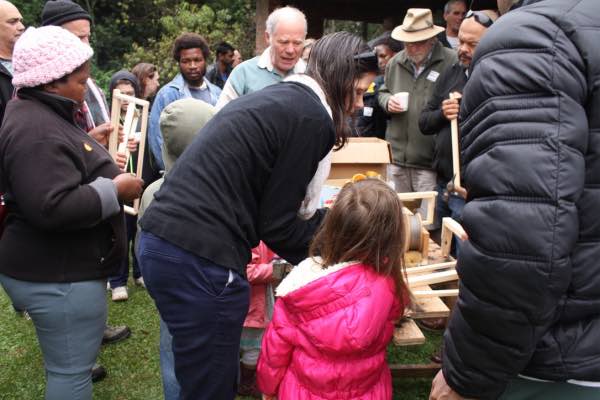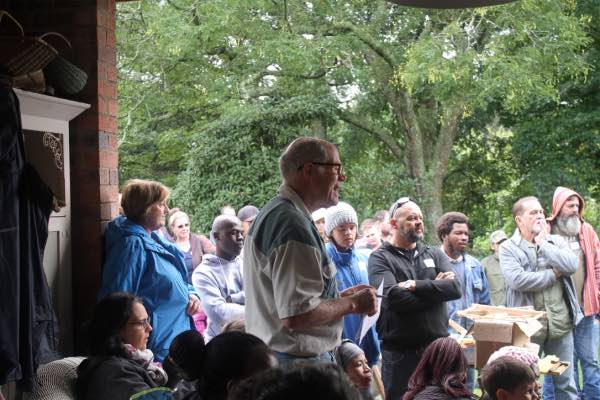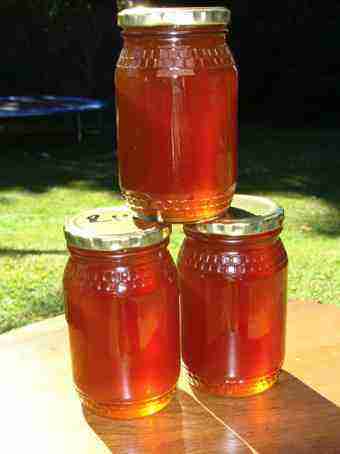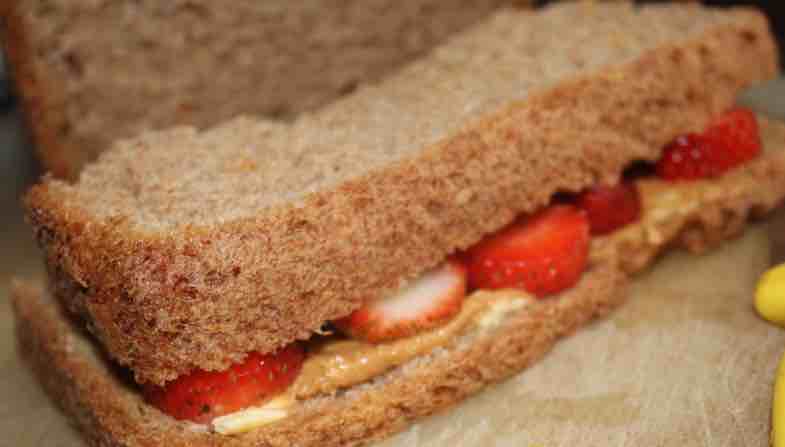- Bernard Preston homepage
- Beekeeping
- Beginners Beekeeping Day
Beginners' beekeeping day
A beginners' beekeeping day is a very good place to start.
Having made the decision you would like to have an apiary, the next step is to attend a beginners' beekeeping day.
It is not a decision one should make lightly. Bees sting and if molested can certainly be dangerous to both you and your neighbours. It is not unlike the plan to purchase a pit-bull. He at least cannot jump a stout fence; insects can obviously with ease.

This page was updated by Bernard Preston 6th January, 2025.
Why would you want to keep a few hives in the garden anyway, if they can sting you and perhaps attack your family?
The reasons are many but the one that probably attracts us most is the realisation that the honey purchased at the local supermarket is highly processed and really does not taste that good; and you may have read that it is quite likely adulterated.
Heating honey and extracting all the pollen destroys most of its value; it is worth little more than high fructose corn syrup or sugar. Start by attending a beginners' beekeeping day and decide if this is really something you want to get into.
Beekeeping shares with gardening many of the lifestyle facets that scientists have now shown are associated with a long and full history; outdoors we are so much less stressed. The physical benefits are enormous compared to those sitting behind a computer, watching TV or even reading a book.
It is a hobby that continues into old age giving one a reason for living; in Japanese it is called "ikigai." At the beginners' day you will meet several elderly keepers who are still enthusiastic about life. And of course you will discover that connectedness with others that is so important.
Firstly you will be taught about the basic protection that you need before opening a hive; and then where to site your apiary.
You will be shown how to assemble frames; and perhaps there will be some discussion about the merits of the Langstroth hive over the much simpler top-bar box.
You will be shown the basic equipment you need; like a smoker and a hive-tool for example. How to use them will be demonstrated.
You will most likely be taken to the honey-room and shown the equipment that you ultimately will have to acquire; and some alternatives.
You may be able to open a hive or two, see the bees at work and possibly harvest a few frames of honeycomb and extract the nectar; you will get to view some of the brood, young larvae that have not yet hatched and may even be lucky enough to catch a glimpse of the queen.
Beginners' beekeeping day
Beginners' beekeeping day is where you will learn the basics and how to avoid a few common but potentially serious mistakes.
Bees are mean creatures; you mess with them at your peril.
Best of all you will get to rub shoulders with others who are also pondering whether beekeeping is a hobby that they would like to start; you can share and discuss your doubts and there will be experienced folk for you to shoot your questions at.
For example, is beekeeping for adults only, or can a child keep a hive or two? Is it expensive" And how much honey can you expect to harvest from your colony?
This is a big decision and a beekeeping day for beginners is where you will have your questions answered.

There will no doubt be several people sprouting forth urging you to make a start, hopefully telling of the pitfalls and cautioning you from rushing into something that you may later regret.
There will certainly be a representative of a local company that manufactures beekeeping equipment present. The first two big items on your shopping list are the gear you will need to protect yourself from their stings; a veil, gloves and overalls. Boots and a smoker too are vital.
And then your first hive and how to fill it with bees, will be the next consideration.
Honey bee traps are not difficult to make but you do need to prepare them in a particular way to make them attractive to a migrating swarm.
The way in which they reproduce is by breeding a new queen and forming swarming bees, usually during a strong honey flow; this is the time to capture your first colony.
There is much to be learned like waxing frames, for example. For that you will need to return for a second beginners' beekeeping day. If you apply your mind, read some books and scour the net, there is no reason why you should not have your first jar of raw honey on the table within a few months.

Beekeeping as a profession
Any person can keep a dozen hives, and make good pocket-money, but to turn beekeeping into a profession is another story. However it is a rewarding business with plenty of free time between honey flows.
With reportedly one in four mouthfuls of food requiring bees for pollination, there is good money to be made by moving hives from a crop such as almonds or macadamias to sunflowers and deciduous fruits.
It takes considerable business acumen as well as solid knowledge of beekeeping to make a success of it as a profession.
Perhaps the best part, whether big or small is that it is not difficult to get your capital back in a relatively short time. A hive costing about R1500 should produce at least 15 kg of honey per year, and often far more than that.
As I write in June, 2021 we are not half way through the year and already I have harvested 450 bottles of honey; 500 grams which I retail for R80 each. That's not bad pocket-money from 11 hives.
Wellness
Humans have a sweet tooth and it's no secret that sugar is extremely bad for us; commercial honey is little better. Both have high glycemic indexes.
But researchers in Germany found that unprocessed honey has a GI of 54; that is low[1]. The average American child consumes 1,500 PB&J sandwiches; they have a huge amount of glycemic starch and are very fattening. Simply a change to the nectar from a local apiarist's hives would help prevent obesity, especially if you started using artisan bread.
Or is it time to start weighing these five reasons to start keeping bees yourself?
Is peanut butter keto is an important question to understand.

These PB&H sandwiches made using sourdough bread are a great favourite in our home; fresh strawberries and honey. Now you have good food.
"I did not get sick.
I was made sick."
- Johan Jacobs, Multiple Sclerosis survivor
When browsing use right click and "Open Link in New Tab" or you may get a bad gateway signal.
Newsletter
Our newsletter is entitled "create a cyan zone" at your home, preserving both yourself and Mother Earth for future generations; and the family too, of course. We promise not to spam you with daily emails promoting various products. You may get an occasional nudge to buy one of my books.
Here are the back issues.
- Lifestyle and ideal body weight
- What are ultra-processed foods?
- Investing in long-term health
- Diseases from plastic exposure
- Intensive lifestyle management for obesity has limited value
- A world largely devoid of Parkinson's Disease
- The impact of friendly bacteria in the tum on the prevention of cancer
- There's a hole in the bucket
- Everyone is talking about weight loss drugs
- Pull the sweet tooth
- If you suffer from heartburn plant a susu
- Refined maize meal and stunting
- Should agriculture and industry get priority for water and electricity?
- Nature is calling
- Mill your own flour
- Bake your own sourdough bread
- Microplastics from our water
- Alternative types of water storage
- Wear your clothes out
- Comfort foods
- Create a bee-friendly environment
- Go to bed slightly hungry
- Keep bees
- Blue zone folk are religious
- Reduce plastic waste
- Family is important
- What can go in compost?
- Grow broad beans for longevity
- Harvest and store sunshine
- Blue zone exercise
- Harvest and store your rainwater
- Create a cyan zone at your home
Did you find this page interesting? How about forwarding it to a friendly book or food junkie? Better still, a social media tick would help.
- Bernard Preston homepage
- Beekeeping
- Beginners Beekeeping Day
Address:
56 Groenekloof Rd,
Hilton, KZN
South Africa
Website:
https://www.bernard-preston.com